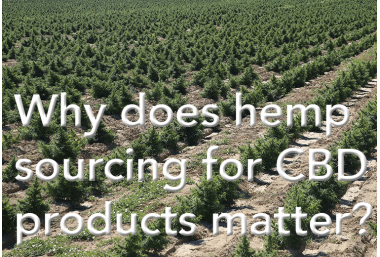Why does hemp sourcing for CBD products matter? Learn the difference between European, Chinese, and American hemp and why Delta only uses hemp grown in Colorado.
Why does sourcing matter?
There are three sources for hemp oil in the world – the United States, Europe, and China. Chinese hemp products are the least expensive, European hemp is the next priciest, and U.S. sourced hemp is the most expensive, mostly due to the high regulatory burden in the United States. Yet, at Delta Botanicals, we source 100% of our hemp oil from Colorado. Why is this? The answer comes down to three things: heavy metals, pesticides, and mold.
Chinese hemp
Chinese hemp oil is the least expensive. However, quality controls are not always up to snuff. All Delta Products are tested to ensure they do not contain any trace amounts of heavy metals, pesticides, and mold.
The Cannabis Sativa plant leaches a significant amount of heavy metal from soils1. Heavy metals can be toxic in the human body. They can increase the risk of psychosis2, cancer3, and kidney disease4. Chinese soils are rich in heavy metals5, and thus Chinese hemp and cannabis products may be at higher risk of containing such contaminants. Pesticides are also used more commonly in China and with less regulation than in Europe or the United States6. A recent study of Chinese herbal medicines found traces of heavy metals and pesticides in a number of samples7.
At Delta Botanicals, we do not use any Chinese-sourced hemp products.
European hemp
European hemp products are generally produced with good manufacturing practices. So why does Delta avoid these?
Due to the particulars of U.S. regulation, it is very difficult to bring purified hemp oil into the country. Most European hemp product is imported as a whole hemp plant and processed in the United States.
However, there are two problems with transporting a large amount of fresh plant matter. One is mold8. Plant matter is often wet and packed into dense, dark containers – perfect conditions for mold growth. The other problem is oxidation. Users of hemp oil want a product that is rich in active CBD. However, if hemp is exposed to oxygen for a long period of time, the active cannabinoids in hemp begin to break down into inactive materials, so the user is getting a lower quality product.
U.S., Colorado hemp
All Colorado hemp growers and processors are required to register with the Industrial Hemp Program pioneered by the Colorado Department of Agriculture (CDA). They are required to use CDA-approved seed and they must submit regular samples for testing to ensure that the plant never contains greater than 0.3% THC and never contains unsafe levels of heavy metals, pesticides, or mold.
To avoid transport-related problems mentioned above, Delta works with Colorado hemp suppliers that process their hemp on-site using supercritical CO2 extraction. This means that hemp oil extraction is only done using the freshest possible hemp, straight from the farm, to avoid any potential development of mold or breakdown of the product. Furthermore, all batches are tested to ensure they contain zero-THC and are free of contaminants prior to shipment.
After a refrigerated overnight shipment to our lab in Baltimore, these pure hemp extracts are blended to produce a consistent cannabinoid/terpene/flavinoid profile. This process is similar to the way modern orange juice is blended to provide a consistent product despite the variance in orange crops year to year.
As a final quality check, Delta submits each batch of mixed product for laboratory testing to ensure every single batch contain zero-THC, full-spectrum CBD, and zero heavy metals, pesticides, and mold.
We work hard to make sure our customers receive the highest-quality products possible, and we will never compromise on quality.
References
- Linger, et al. Industrial hemp (Cannabis sativa L.) growing on heavy metal contaminated soil: fibre quality and phytoremediation potential. Industrial Crops and Products. Volume 16, Issue 1, July 2002, Pages 33-42.
- Jan, et al. Heavy Metals and Human Health: Mechanistic Insight into Toxicity and Counter Defense System of Antioxidants. Int J Mol Sci. 2015 Dec; 16(12): 29592–29630.
- Kim, et al. An Overview of Carcinogenic Heavy Metal: Molecular Toxicity Mechanism and Prevention. J Cancer Prev. 2015 Dec; 20(4): 232–240.
- Barbier, et al. Effect of heavy metals on, and handling by, the kidney. Nephron Physiol. 2005;99(4):p105-10. Epub 2005 Feb 17.
- Chen, et al. Heavy Metal Pollution in Soils in China: Status and Countermeasures. Journal of the Human Environment 1999 Mar; 28(2):130-134.
- Zhang, et al. Global pesticide consumption and pollution: with China as a focus. Proceedings of the International Academy of Ecology and Environmental Sciences, 2011, 1(2):125-144.
- Harris, et al. Heavy metal and pesticide content in commonly prescribed individual raw Chinese Herbal Medicines. Science of The Total Environment. Volume 409, Issue 20, 15 September 2011, Pages 4297-4305.
- Janssen, et al. Two underestimated threats in food transportation: mould and acceleration. Philos Trans A Math Phys Eng Sci. 2014 Jun 13; 372(2017): 20130312.
- Colorado Department of Agriculture. Industry-Wide Bulletin Re: Industrial Hemp Testing. September 11, 2018. Accessed February 14, 2019.

